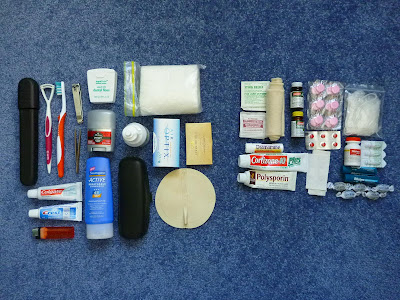Do clothes make the man? I’m not so sure. But what I do know is that luggage makes the traveler—or unmakes him, depending on its quantity. Everyone’s heard to pack light(ly), but how does one balance that steady mantra against the multitudinous demands of daily life? Well, I’m of course outside my realm here since I have yet to actually leave on this trip, but I’ve put in a lot of time reading up on the must-brings and the better-left-at-homes, and so below is my answer to the question. I’m going to omit commentary and just stick to bullet points, but if you’re curious why I took this or didn’t take that, feel free to ask in the comments. And if any prospective backpackers happen upon this page and are curious to learn more, I've added a list of helpful backpacking guides to the bottom of this post. So without further ado, meet my baggage:
Clothes
-sport sandals
-2 pairs of quick-drying, light travel pants
-2 long-sleeve shirts
-1 polo
-1 microfleece
-long-sleeve underarmor shirt
-swimtrunks
-3 pairs underarmor underwear -2 pairs of short socks
-2 pairs long socks (for mosquito protection)
-1 pair wool socks
-2 bandanas
-baseball hat
Documents, Sleeping Stuff, and Day-to-Day
Top left:
-license
-driving permit
-passport
-fake passport (to use as a decoy; made out of an old, expired passport)
-vaccination record
-yellow vaccination card
-camera, spare battery, second memory card, USB connection cord, and charger
-USB storage device
-small flashlight
-outlet adapter
-cell phone and charger
-audio recorder (why? I'm not entirely sure, just felt right)
-notepad
-pen
-journal
-book
-extra passport photos
-not shown:
-family photo and several of home
-laminated photocopy of passport (didn't have it yet)
-debit cards
-travelers checks
Bottom Left:
-earplugs
-pillowcase (to stuff with dirty clothes and use as pillow)
-small, super-absorbent towel
-sleeping bag liner (to use in lieu of a real sleeping bag)
-padlock and loop of wire cable (to lock backpack to secured object)
-small combination locks
-clothes line and four clothes pins
-sewing kit
-pocket knife
-spoon
Right:
-money belt
-4 ziploc bags
-woven change purse
-2 big paperclips for holding money
-rubber bands
-nylon string
-safety pins
-platypus-style collapsible water bottle
-travel chess set
-deck of cards
-keyring compass
-Thermarest lumbar pillow
-Spanish-English dictionary
-small insect repellent
-sunglasses case (with sunglasses)
-umbrella
-poncho
-nylon mesh daybag
Toiletries and Medicine
Left:
-toilet paper
-glasses and case
-contact lenses and solution
-toothpaste
-deodorant
-sunblock
-little bit of soap
-floss
-drain stopper
-lighter
-nail clippers
-tweezers
-toothbrush
-tongue scraper
Right:
-iodine (water purification) tablets
-antibiotic/antiseptic cream
-antiseptic toilettes (2)
-anti-itch toilettes (2)
-gauze tape
-painkiller
-diarrhea blocker
-laxatives
-cough medicine (Sudafed)
-dramamine
-bandaids
-latex glove
-lip salve (2)
-sore throat lozenges
-hydrocortisone
When it's all packed up, here’s how it looks:
That's it! Compact, light, and hopefully far less enticing than some other traveler's luggage/backpack. And with that, I'm off!
Backpacking Guides:
Written by well-seasoned backpackers with years if not decades of world-travel experience, the below resources are indispensible for the first-time backpacker. All cover roughly the same topics— what (not) to bring, how to be safe, money, staying healthy, how to meet locals, food, keeping in touch, etc.— but each author gives his own perspective, and the degree of corroboration between them is encouraging for the nervous travel student. Especially recommended is the first link, Travel Independent.
 1) Hanging out for four days behind the counter of my host's art store, laughing and joking with three of the workers (Kenia, Fuyi, and Michel). I learned more about mexican food and culture from them than I ever could have imagined.
1) Hanging out for four days behind the counter of my host's art store, laughing and joking with three of the workers (Kenia, Fuyi, and Michel). I learned more about mexican food and culture from them than I ever could have imagined.




